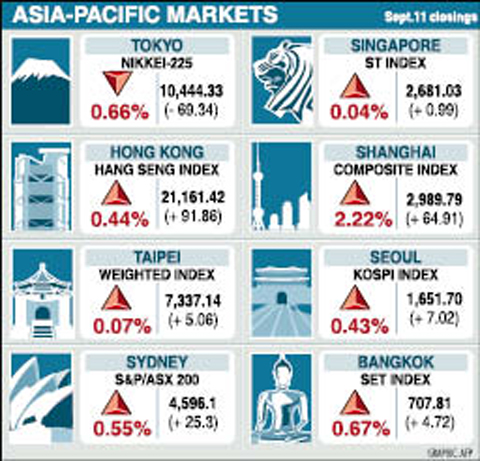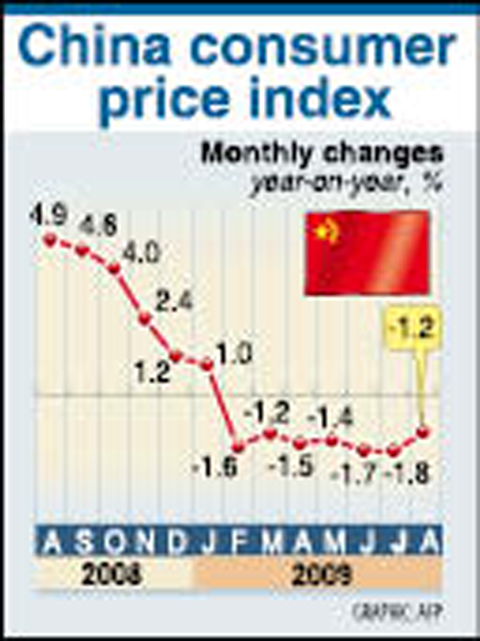Asian stocks rose 4.4 percent in the week to the highest level in a year as the G20 nations agreed on measures to shore up the financial system and China reported better-than-expected economic data.
National Australia Bank Ltd climbed 6.7 percent as G20 finance chiefs agreed on a regulatory blueprint to help avoid a repeat of the global financial crisis. China Unicom (Hong Kong) Ltd (中國聯通) rallied 6.9 percent after China’s industrial production rose last month from a year earlier.
“It’s clear there’s an ongoing commitment by the authorities to make sure this recovery works,” said Nader Naeimi, a Sydney-based strategist at AMP Capital Investors, which manages about US$75 billion. “Together with the evidence of a recovery we’re already seeing, it points to a continuing improvement in the economic outlook.”

The MSCI Asia-Pacific Index climbed 4.4 percent to 117.82 in the past five days, its seventh week of alternating between gains and losses. The gauge has surged 67 percent from a more than five-year low on March 9 on speculation the global economy is recovering.
China’s Shanghai Composite Index rose 4.5 percent in the week as the statistics bureau said industrial production increased 12.3 percent last month from a year earlier, beating the 11.8 percent median estimate of 15 economists surveyed by Bloomberg News. Urban fixed-asset investment for the eight months to Aug. 31 climbed 33 percent, more than the 32.7 percent median estimate in a survey of economists.
Japan’s Nikkei 225 Stock Average advanced 2.5 percent, even as the Cabinet Office reported that the country’s economy grew at a 2.3 percent annual rate in the second quarter, lower than the 3.7 percent expansion originally estimated.

Taiwanese share prices are expected to turn quiet next week as the market falls into a consolidation mode after recent gains, dealers said on Friday.
Interest in electronic heavyweights is fading as investors are likely to continue to take profits, while earnings concerns may also keep buyers at bay, they said.
For the week to Friday, the weighted index rose 184.01 points or 2.57 percent to 7,337.14 after a 5.04 percent increase a week earlier.
Other market on Friday:
SYDNEY: Up 0.55 percent. The S&P/ASX 200 climbed 25.3 points to 4,596.1.
SEOUL: Up 0.43 percent. The KOSPI added 7.02 points at 1,651.70. Financial stocks were mostly higher on hopes of improved earnings results in the second half, amid signs of worldwide economic recovery.
SINGAPORE: Flat. The Straits Times Index edged 0.99 points, or 0.04 percent, lower to 2,681.03. “I think everybody is just waiting for the weekend. Wall Street set a new [year-to-date] high overnight, but people are hoping for more good news,” a dealer at a foreign brokerage said. “How much money can you keep pumping in without taking something off the table?”
BANGKOK: Up 0.67 percent. The Stock Exchange of Thailand rose 4.72 points to close at 707.81.
KUALA LUMPUR: Up 0.59 percent. The Kuala Lumpur Composite Index gained 7.0 points to 1,208.28. The market is at a new high for this year.
JAKARTA: Up 0.17 percent. The Jakarta Composite Index added 4.08 points to 2,415.94.
MANILA: Up 1.23 percent. The composite index added 34.92 points to 2,870.83. “The US market broke out so this market has a chance to see if it can test higher resistance levels,” Nestor Aguila of DA Market Securities said.
WELLINGTON: Up 0.33 percent. The NZX-50 rose 10.50 points to 3,137.18.
MUMBAI: Up 0.29 percent. The 30-share SENSEX rose 47.44 points to 16,264.30.

STILL COMMITTED: The US opposes any forced change to the ‘status quo’ in the Strait, but also does not seek conflict, US Secretary of State Marco Rubio said US President Donald Trump’s administration released US$5.3 billion in previously frozen foreign aid, including US$870 million in security exemptions for programs in Taiwan, a list of exemptions reviewed by Reuters showed. Trump ordered a 90-day pause on foreign aid shortly after taking office on Jan. 20, halting funding for everything from programs that fight starvation and deadly diseases to providing shelters for millions of displaced people across the globe. US Secretary of State Marco Rubio, who has said that all foreign assistance must align with Trump’s “America First” priorities, issued waivers late last month on military aid to Israel and Egypt, the

‘UNITED FRONT’ FRONTS: Barring contact with Huaqiao and Jinan universities is needed to stop China targeting Taiwanese students, the education minister said Taiwan has blacklisted two Chinese universities from conducting academic exchange programs in the nation after reports that the institutes are arms of Beijing’s United Front Work Department, Minister of Education Cheng Ying-yao (鄭英耀) said in an exclusive interview with the Chinese-language Liberty Times (the Taipei Times’ sister paper) published yesterday. China’s Huaqiao University in Xiamen and Quanzhou, as well as Jinan University in Guangzhou, which have 600 and 1,500 Taiwanese on their rolls respectively, are under direct control of the Chinese government’s political warfare branch, Cheng said, citing reports by national security officials. A comprehensive ban on Taiwanese institutions collaborating or

France’s nuclear-powered aircraft carrier and accompanying warships were in the Philippines yesterday after holding combat drills with Philippine forces in the disputed South China Sea in a show of firepower that would likely antagonize China. The Charles de Gaulle on Friday docked at Subic Bay, a former US naval base northwest of Manila, for a break after more than two months of deployment in the Indo-Pacific region. The French carrier engaged with security allies for contingency readiness and to promote regional security, including with Philippine forces, navy ships and fighter jets. They held anti-submarine warfare drills and aerial combat training on Friday in

COMBAT READINESS: The military is reviewing weaponry, personnel resources, and mobilization and recovery forces to adjust defense strategies, the defense minister said The military has released a photograph of Minister of National Defense Wellington Koo (顧立雄) appearing to sit beside a US general during the annual Han Kuang military exercises on Friday last week in a historic first. In the photo, Koo, who was presiding over the drills with high-level officers, appears to be sitting next to US Marine Corps Major General Jay Bargeron, the director of strategic planning and policy of the US Indo-Pacific Command, although only Bargeron’s name tag is visible in the seat as “J5 Maj General.” It is the first time the military has released a photo of an active